Capacitors are electronic components necessary in your air conditioning system. Like any other air conditioner parts, they are also subject to failure, notably under the stress of a severe workload.
So can AC capacitor work intermittently? We've done in-depth research and have the answer!
In general, voltage overloaded or improper current flowing through your air conditioner's capacitor may lead to it functioning intermittently.
Failure in your capacitor could result in your entire air conditioning system breakdown. Thus, proper maintenance and servicing are essential.
The capacitor plays a crucial role in starting your air conditioner system and keeping it working smoothly. At the end of this post, expect us to share the necessary knowledge you need.
We will teach you how to replace your air conditioner capacitor to ensure your safety correctly. With that said, let's dive right in!
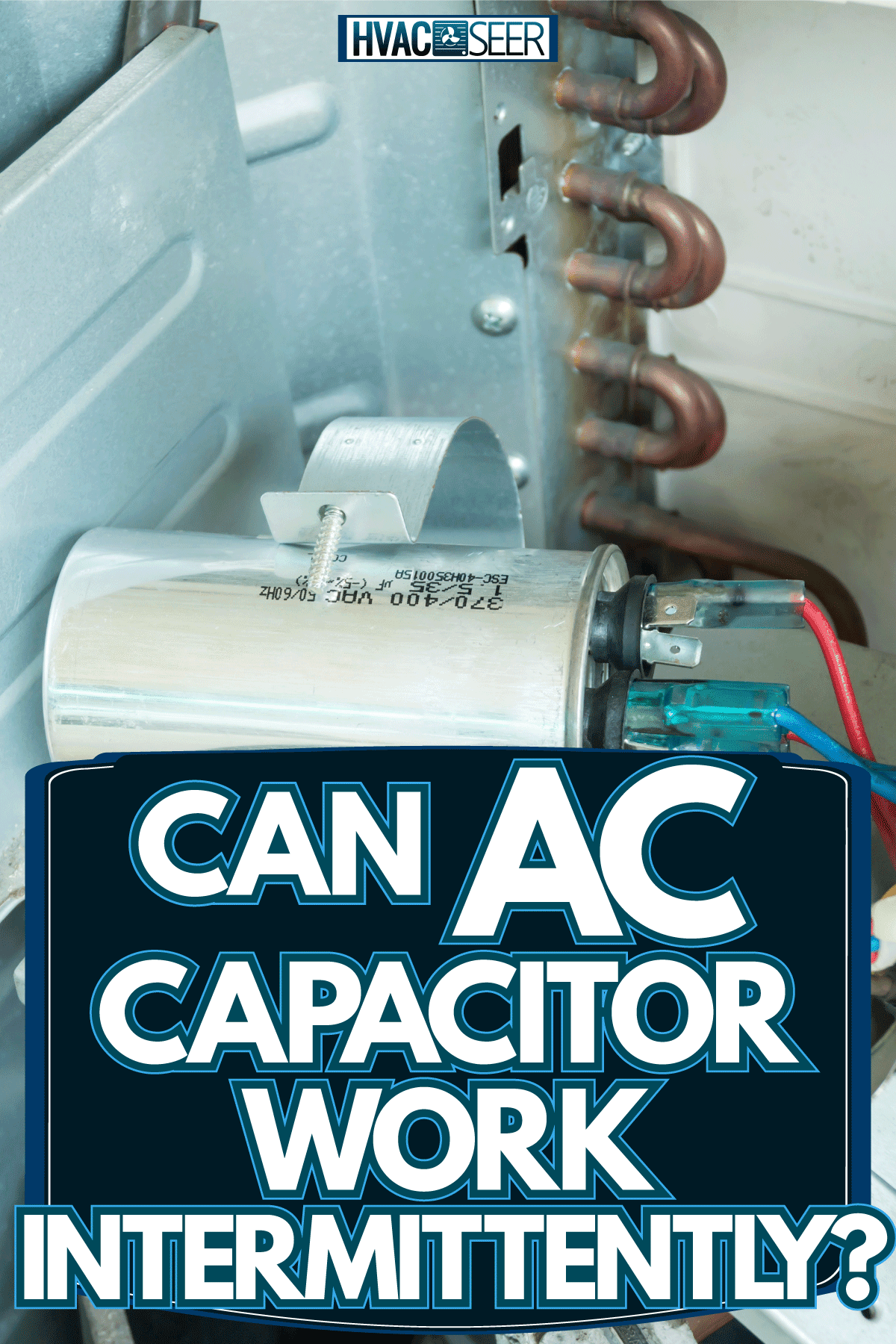
What Does An AC Capacitor Do?
Your air conditioning unit uses a capacitor to collect energy and store them. In short, It is an electrical energy storage system. The air conditioner capacitor controls voltage and kicks on the cooling system's motors.
As the capacitor powers the motors inside your air conditioner unit, it is also essential for the air conditioner to function.
In addition, the majority of air conditioner system capacitor failures cause breakdowns.
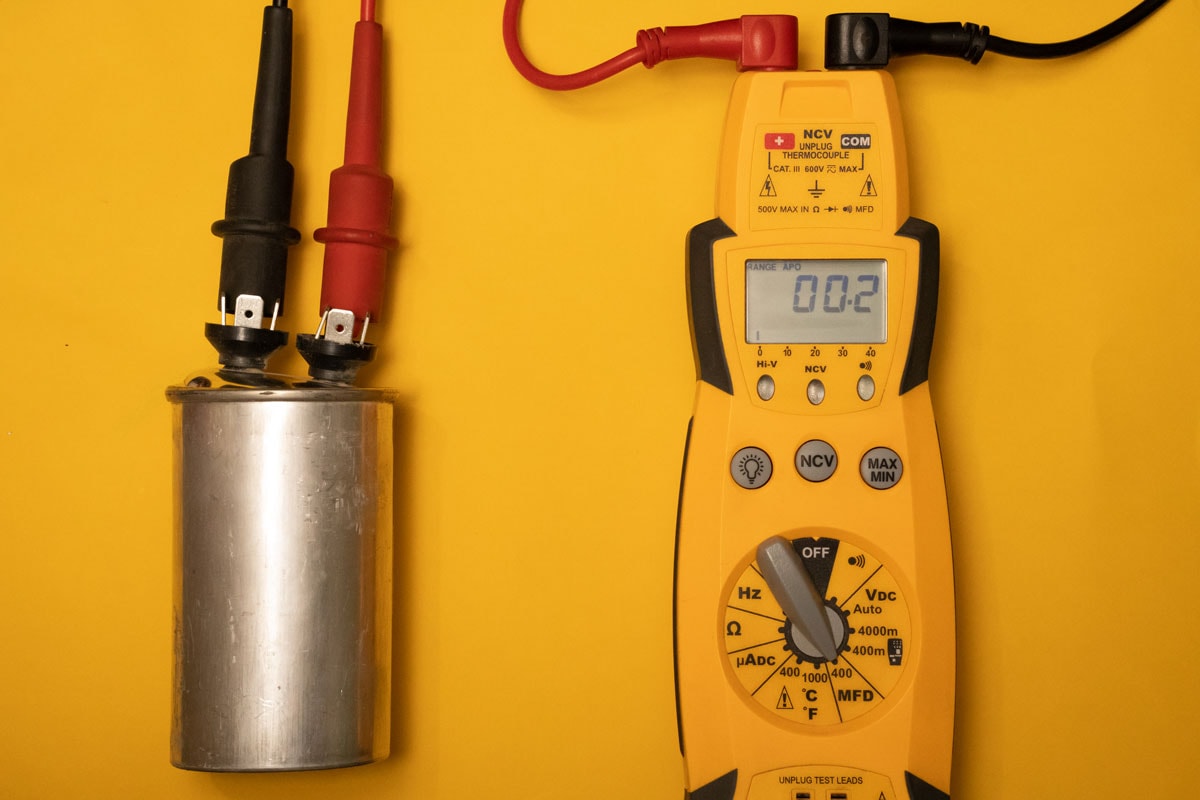
Two Types Of Air Conditioner Capacitors
Capacitors are essential to the air conditioner system. It has two common types: the start capacitor and the run capacitor.
Notable Differences Between These Capacitors
Start capacitors offer a quick voltage boost when the power supply is turned on for the first time. This boost has the energy of around 70 and 120 micro Farads to start the air conditioner motor to run.
In contrast, the run capacitor supplies the power to the AC's fan motor at about 7-9 micro Farads. It controls the current from the initial boost, keeps the proper voltage drop, and adjusts accordingly to its demand.
This ensures that the fan motor will have a sufficient current load to keep running.
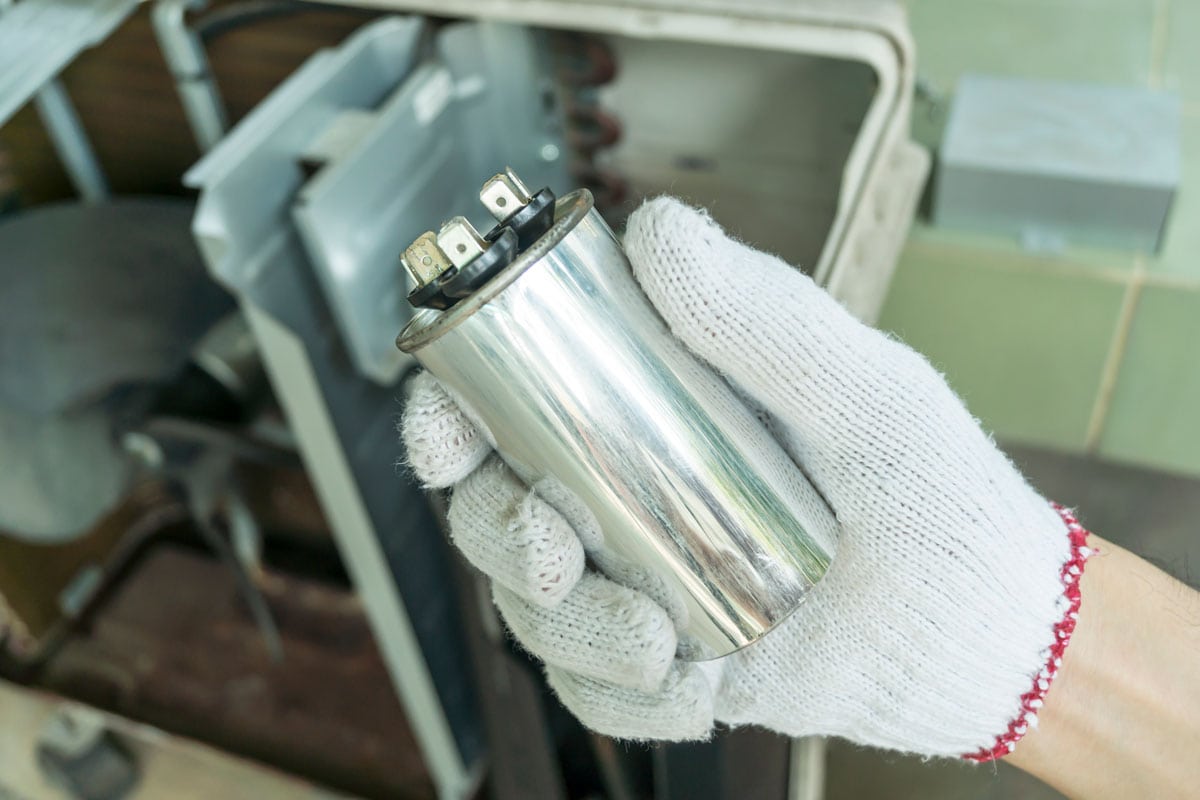
What Causes A Capacitor To Have Problems?
The capacitor might malfunction for a variety of reasons. In comparison, only a qualified heating and cooling technician can pinpoint the precise cause of why the capacitor in your specific air conditioner has issues.
The following are some of the common causes of your capacitor failing:
- Improper voltage current.
- Overly old capacitors may function intermittently.
- Overheating the unit can cause the capacitor to fail.
- Physical damage in your capacitor, like when debris inside your system hits it.
Signs Of A Bad Capacitor
If the insulator deteriorates, capacitor charges become erratic and can short circuit.
While any capacitor may malfunction, electrolytic kinds are particularly prone since the chemicals deteriorate over time.
You can observe the signs of a bad capacitor on the following checklist below:
Bulges
As a safety precaution, electrolytic capacitor metal covers have score lines cut into them by suppliers. If the component breaks, the chemical electrolyte may expand, applying pressure on the capacitor's body.
The vents make some of the capacitor covers break rather than explode. Contact your capacitor maker for proper handling of the unit's waste.
Leaks
A poor quality capacitor and continuous exposure to a high voltage will leak the chemical insulator. In addition to failing, it also increases the chance of harming its copper foil or other parts.
High Power Bills
Are you noticing a rise in your energy costs? A bad capacitor could be one to blame. Your air conditioning unit will use more power to meet the system's cooling demand.
The harder your cooling system works, the more it requires energy, causing your power bills to inflate.
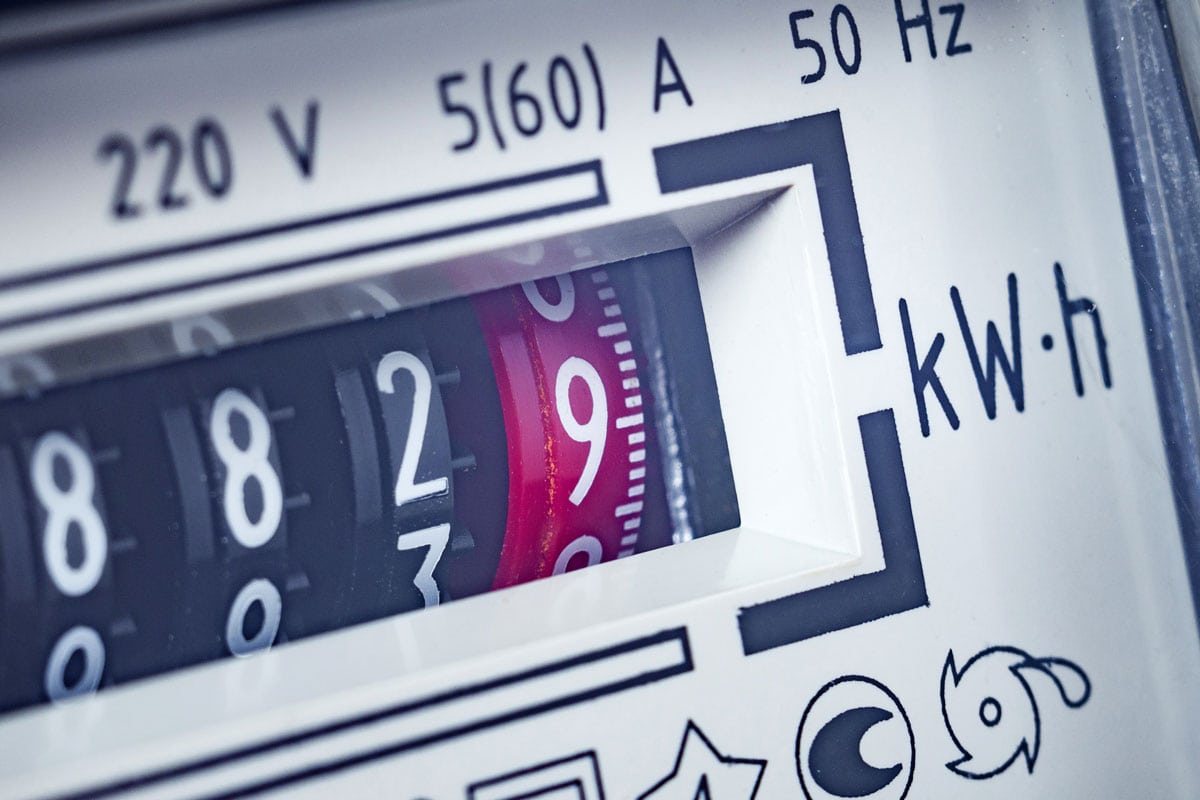
Poor Cooling
The fan motors of your air conditioner will stop operating if the capacitor fails. As a result, your air conditioner unit stops blowing cool air and, worst, damaging the whole system.
Smokes
A bad capacitor may release black smoke causing your interior machine to be full of a dark soot coating. This is due to chemicals heating within the capacitor.
Furthermore, this issue shows when your capacitor is aging. Thus, wear and tear are inevitable.
Strange Noise
A bad capacitor may make a strange or humming noise in your air conditioning unit. This will occur when insufficient power is fed to your air conditioner unit due to a bad capacitor.
AC Starts Up Slowly And Turns Off Suddenly
When the air conditioner takes some time to switch ON, this is another sign of a failing or bad air conditioner capacitor. This will often lead the system to switch OFF suddenly on its own.
How Do You Know If Your AC Capacitor Is Working?
You can test a capacitor for functionality by charging it and then reading the voltage between the anode and cathode. Remove the battery from the capacitor once the charge is complete.
Check the voltage on the capacitor lines with the multimeter. It should show a voltage of about 9 volts. If the reading shows a rapid drop in the voltage level, it's not working and should be replaced.
Check out this multimeter on Amazon.
How Do You Replace An Air Conditioner Capacitor?
It's simple to replace an air conditioner capacitor, which is necessary to do before it damages the other components of your air conditioner.
To replace the capacitor properly:
- Switch OFF the air conditioner's power supply.
- Remove the panel of your outdoor unit to access the capacitor.
- Evaluate the capacitor's physical status using our bad capacitor checklist.
- Before removing the capacitors' wiring, ensure to have markings or photos for later usage.
- Gently discharge and remove the capacitor.
- Ensure to buy the exact capacitor model.
- Securely reattach the new capacitor.
- Reconnect the capacitors wire using your markings and photo as a guide.
- Put back ON the air conditioner's power supply.
The capacitor replacement process needs better electrical knowledge to ensure the quality of the job.
Can I Replace A Capacitor On My Own?
As you are aware, your air conditioner unit is connected to one or even more capacitors. These capacitors contain a high electrical voltage to seriously injure you if you miss handling this procedure.
So, we highly urge you against trying this on your own. Without the proper knowledge and expertise, doing so will result in fatal injury.
WARNING: Please contact your air conditioner installer or technician to ensure safety!

Do Capacitors Fail Over Time?
If the capacitor works at or below its maximum set limits, most electrical materials will eventually deteriorate over time. Just like other rechargeable batteries, capacitors will also gradually lose their efficiency.
The capacitor may withstand several repeating processes of high voltage charges. However, this could lead to an early breakdown of your entire air conditioning system.
How Long Does An AC Capacitor Last?
Your AC capacitor should have a lifespan of at least ten years. The frequency of use and how well you take care of your capacitor will determine how long it will last.
Additionally, you can prolong its service life even more by giving it routine check-ups and inspections.
How Much Does A Capacitor Replacement Cost?
A brand-new air conditioner capacitor typically costs between $30 and $50. However, labor for changing your AC capacitor can cost anything from $100 to $200.
Check out this capacitor on Amazon.
The skill level and the time needed to complete the job decide the price.
Can An Air Conditioner Run With A Bad Capacitor?
To Wrap Things Up
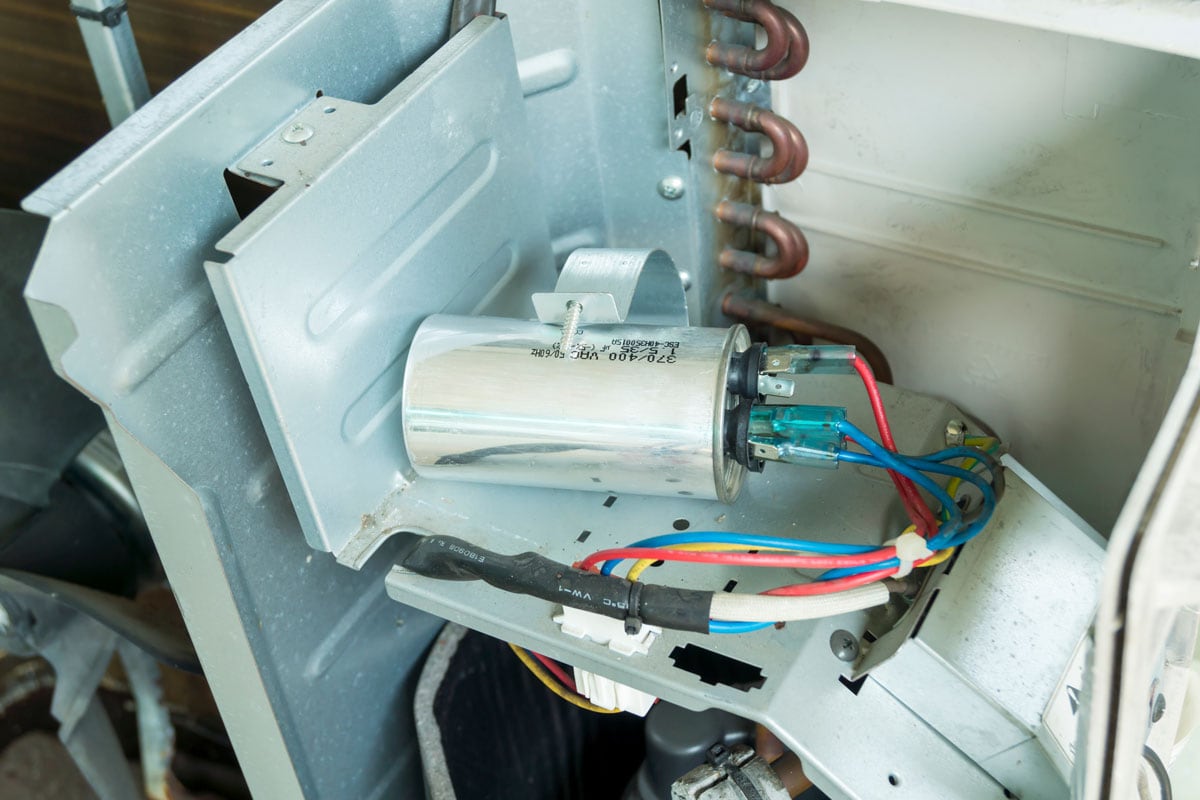
Your air conditioner's capacitor is one among many components that helps the system run efficiently. You must check it regularly to keep the capacitor in its best shape.
This post taught us the causes of your air conditioner's capacitor going bad. You also know how to replace the faulty capacitor safely, and we also cover some of the related topics that we surely have in your mind.
We can now leave you this vital information to help you care for and maintain your AC capacitor.
Made it this far? Check out these related articles below!


